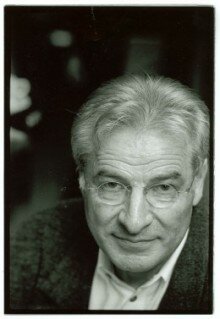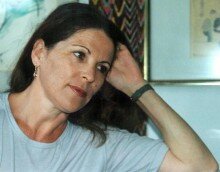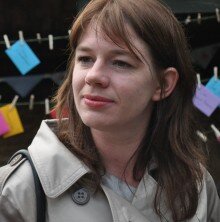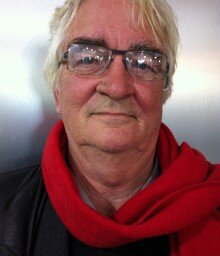
Mark Insingel made his debut in 1963 with the collection Drijfhout (Driftwood). From the outset he wrote in an experimental style that made a stand for social relevance, seeing autonomous literature as the last refuge for freedom of expression within a society increasingly focused on reproduction. Language is at the heart of Mark Insingel’s oeuvre. His writing is based on an idiosyncratic, creative relationship with existing forms of expression such as slogans, traditional proverbs and idiomatic phrases, which he undermines and in his unique way playfully and unexpectedly combines in varying settings to eke out new meanings.
This attention to the aural and visual aspects of language led, amongst other collections, to PERPETUUM MOBILE (1969), the first volume of concrete poetry in the Dutch language, and Posters (1974).
The almost mathematical structure of Insingel’s poems is a result of the variegated and modulating way in which verses are repeated and juxtaposed, giving the impression that his writing originates in mathematical logic. Not only are individual poems structured in this manner, some books are also consciously conceived as ‘linguistic algorithms’. In Dat wil zeggen (In Other Words; 1975) the texts are generated using preconceived basic rules, with every third text recapturing a preceding text. Through this network of similarity and contrast, a rhythm emerges, which is elaborated upon with almost mathematical precision. Language thus becomes the chosen place of being.
His consistently maintained predilection for the avant-garde has relegated Mark Insingel to the margins of the literary landscape, and as a result his work has never been fully appreciated. This has not stopped him from writing, however, and in 1990 his provisional collected poems were published, entitled In elkanders armen (In Each Other’s Arms). The recently published minimalist love poems in Niets (Nothing; 2005), for which he received the Publieksprijs (Readers' Prize) for best poetry volume, and in Iets (Something; 2007), nominated for the Herman de Coninck prize, appear to have caught the attention of a younger generation of poetry readers.
Selected Bibliography
Poetry
Drijfhout (Driftwood), Colibrant, Deurle, 1963
PERPETUUM MOBILE, Meulenhoff, Amsterdam, 1969
Posters, Orion, Bruges, 1974
Dat wil zeggen (In Other Words), Sonneville, Bruges, 1975
In elkanders armen (In Each Other’s Arms), In de Knipscheer, Haarlem, 1990
Niets (Nothing), Poëziecentrum, Ghent, 2005
Iets (Something), Poëziecentrum, Ghent, 2007
Prose
Bespiegelingen (Reflections), Meulenhoff, Amsterdam, 1968
Eenzaam lichaam (Lonely Body), In de Knipscheer, Haarlem, 1996
Translations
In English
Reflections, Calder and Boyars, London, 1971
Reflections, Red Dust, New York, 1972
A course of time, Red Dust, New York, 1977
When a lady shakes hands with a gentleman, Red Dust, New York, 1982
My territory, Red Dust, New York, 1987
In German
Spiegelungen, Limes Verlag, Wiesbaden, 1977
Mein Territorium; Mit gehobenem Kopf In: Grenzüberschreitungen, oder Literatur und Wirklichkeit, Wirtschaftsverlag, Bremerhaven, 1982
Literary prizes
Literary Prize of De Vlaamse Gids (1970)
ANV-Visser Neerlandia-prize (1975)
Readers’ Prize (2007)
Herman de Coninck prize (nomination, 2007)
Links
Poëziecentrum, The publisher of Mark Insingel







